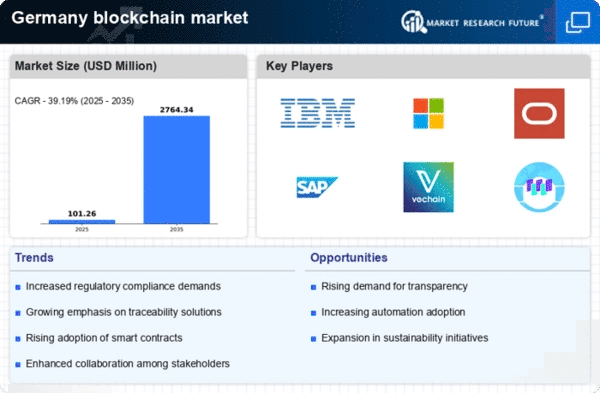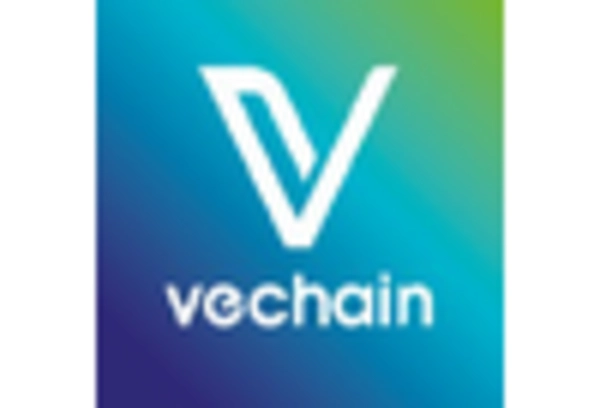Rising Demand for Transparency
The blockchain supply-chain market in Germany is experiencing a notable surge in demand for transparency among consumers and businesses alike. This trend is driven by the increasing awareness of ethical sourcing and the need for traceability in product origins. According to recent studies, approximately 70% of consumers in Germany express a preference for brands that provide clear information about their supply chains. This demand for transparency compels companies to adopt blockchain technology, which offers immutable records and real-time tracking capabilities. As a result, businesses are investing in blockchain solutions to enhance their credibility and build trust with consumers. The integration of blockchain in supply chains not only improves operational efficiency but also aligns with the growing consumer expectation for accountability, thereby propelling the blockchain supply-chain market forward.
Increased Focus on Data Security
Data security concerns are becoming increasingly paramount in the blockchain supply-chain market in Germany. With the rise of cyber threats, businesses are seeking robust solutions to protect sensitive information related to their supply chains. Blockchain technology offers a decentralized and secure framework that mitigates risks associated with data breaches. A survey conducted among German enterprises revealed that over 60% consider data security a critical factor in their supply chain operations. Consequently, companies are investing in blockchain systems that enhance data integrity and confidentiality. This heightened focus on security not only safeguards business interests but also reassures consumers, thereby contributing to the overall growth of the blockchain supply-chain market.
Technological Advancements in Logistics
Technological advancements in logistics are significantly influencing the blockchain supply-chain market in Germany. Innovations such as the Internet of Things (IoT) and artificial intelligence (AI) are being integrated with blockchain to optimize supply chain operations. For instance, IoT devices can provide real-time data on inventory levels and shipment conditions, which can be securely recorded on a blockchain. This integration enhances visibility and reduces the risk of fraud. Reports indicate that the logistics sector in Germany is projected to invest over €5 billion in digital transformation by 2026, with a substantial portion allocated to blockchain solutions. These advancements not only streamline processes but also foster collaboration among supply chain partners, thereby driving the growth of the blockchain supply-chain market.
Growing Interest in Decentralized Finance
The growing interest in decentralized finance (DeFi) is influencing the blockchain supply-chain market in Germany. As businesses explore innovative financial solutions, the integration of DeFi principles into supply chain financing is becoming more prevalent. This shift allows for more efficient capital allocation and reduces reliance on traditional banking systems. Reports suggest that the DeFi market in Germany could reach €10 billion by 2027, indicating a strong potential for blockchain applications in supply chain financing. By leveraging smart contracts and blockchain technology, companies can streamline payment processes and enhance liquidity. This trend not only supports the financial health of businesses but also contributes to the overall expansion of the blockchain supply-chain market.
Government Initiatives Supporting Innovation
Government initiatives in Germany are playing a pivotal role in fostering innovation within the blockchain supply-chain market. The German government has launched various programs aimed at promoting the adoption of blockchain technology across industries. For instance, funding opportunities and research grants are available for companies developing blockchain solutions that enhance supply chain efficiency. Additionally, regulatory frameworks are being established to support the safe implementation of blockchain in logistics. These initiatives are expected to stimulate investment and collaboration among stakeholders, potentially leading to a more robust blockchain supply-chain market. As a result, businesses are encouraged to explore blockchain applications, which may lead to improved operational efficiencies and competitive advantages.
















